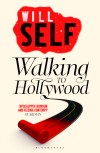“A bravura collection of short stories about a much-abused human organ”
Will Self is rightly admired for the sheer energy of his writing, his pyrotechnic wit and wordplay, and his willingness to experiment with genre and narrative. He is also criticised as ill-disciplined, self-indulgent and more concerned with style than substance. These strengths and weaknesses are both on display in Liver, which he characteristically subtitles A Fictional Organ with a Surface Anatomy of Four Lobes. This is not simply a fancy way of saying the book consists of four interrelated stories: “surface anatomy” is a technical term for the description of features that can be discerned merely by looking at, rather than dissecting, an organism. So, is there more here than meets and dazzles the eye?
Livers feature largely in the first three stories: being destroyed by alcohol in Foie Humain, colonised by cancer in Leberknödel, and devoured by a vulture in Prometheus. They disappear from view in Birdy Num Num, the least satisfactory story, which instead describes a group of drug addicts waiting for their fix, and is narrated by a virus. The book nevertheless ends where it began, in hell – and this is perhaps its real subject.
To read the rest of the review, visit the Sunday Times here:

